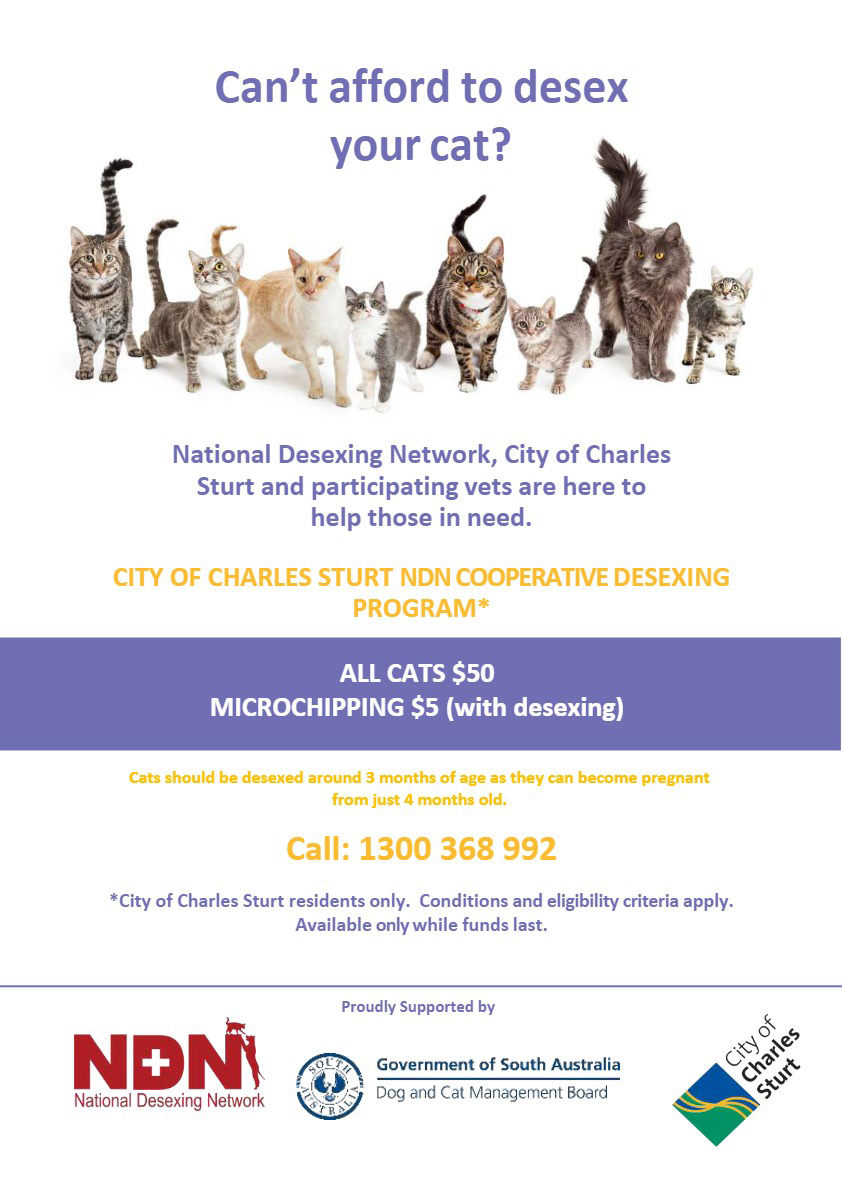Cats can be cuddly companions. They are great pets: clean, economical and low-maintenance.
Here’s how to care for your cat in the City of Charles Sturt.
Caring for your cat
- You must microchip your cat, with contact details recorded on the state database: www.dogsandcatsonline.com.au.
- Give your cat a collar with your current contact details on it. This will avoid lost or stolen pets and will ensure your cat is not classified as a stray.
- Desex your cat.
- Keep your furry friend inside at night. This helps reduce disease, cat fights, road accidents and killing of local wildlife.
- Build a cat run or enclosure to contain your cat in your yard.
- Apply for a permit if you want to keep more than 2 cats per household.
For more tips, check out the RSPCA's Guide to Keeping Your Cat Safe and Happy at Home.
We've also put together our own page of useful tips via the button below.
You can have up to 2 cats in your home.
This is a requirement under our by-laws. You may apply for a permit to keep more than 2 cats (fees apply).
Desexing
Cats born after 1 July 2018 must be desexed by 6 months of age or 28 days after purchase by the owner (whichever is later). We have compulsory desexing laws to reduce the number of stray cats and unwanted litters.
Desexed cats:
- Have reduced risk of cancer and disease of the reproductive organs
- Avoid suffering from physical and nutritional exhaustion if continually breeding
- Generally live longer and healthier lives
Behavioural benefits:
- Cats are less prone to wander, fight, get lost or get injured
- Reduces territorial behaviour like spraying indoors
- Less likely to suffer from anti-social behaviours
- Desexed cats become more affectionate and better companions
- Eliminates "heat" cycles in female cats and their efforts to get outside in search for a mate
We have joined forces with the National Desexing Network to offer subsidised desexing to eligible residents

Microchipping
All dogs and cats in South Australia must be microchipped.
Microchipped cats carry a permanent identification. If lost, they are reunited with their families much sooner.
It is the cat owner’s responsibility to ensure their details including the microchip number are recorded and kept up to date at www.dogsandcatsonline.com.au.
For discounted microchipping visit www.chipblitz.com.
If you are no longer able to look after your pet, you can take it to the Animal Welfare League (AWL).
By relinquishing ownership of your pet, the AWL retains decision-making power in relation to rehoming.
If you know the owner of a nuisance cat, the best approach is to first have a conversation. We encourage you to first approach the cat owner in a friendly manner. Explain what impact their cat is having on your property or environment.
Need help? Our Council Community Safety Officers can support you with advice and information to approach a neighbour. Call us on 8408 1111.
Any person may humanely trap a cat on property that they own or occupy.
If an identified cat is trapped, it must be released immediately, at the location it was trapped, as required under the Dog and Cat Management Act 1995.
If an unidentified cat is trapped, it may be released or delivered to the Animal Welfare League (prior approval is strongly recommended due to periodic closures). They will make a decision as to whether to keep the cat to rehome it, or euthanase it humanely.
Trapped cats cannot be kept in cages in inclement weather conditions, for any period of time without water and shelter from the weather. To do so constitutes an offence of animal cruelty under the Animal Welfare Act 1985.
For any reports of animal cruelty please contact the RSPCA on 1300 477 722.
